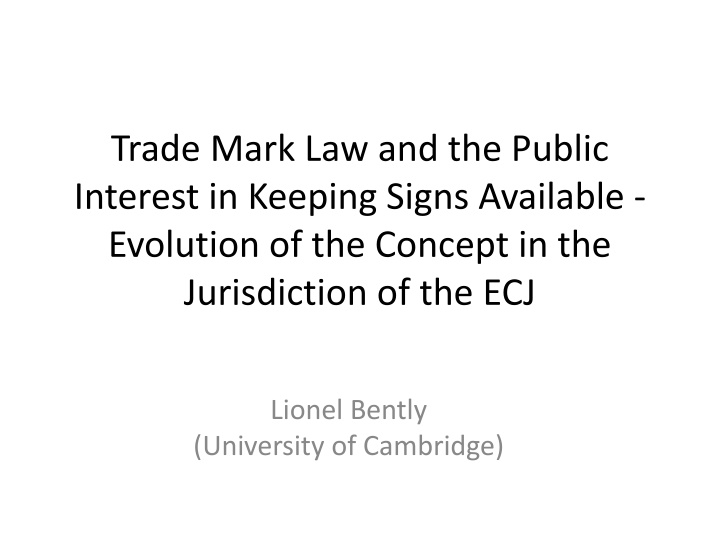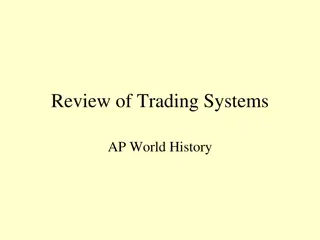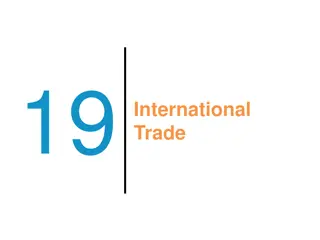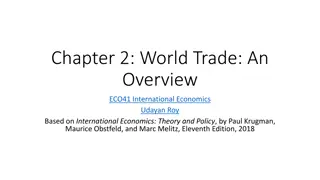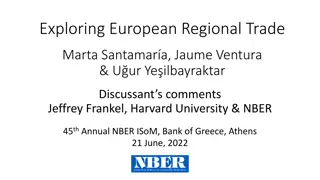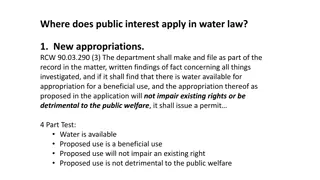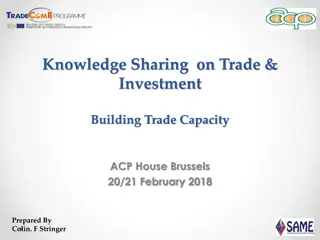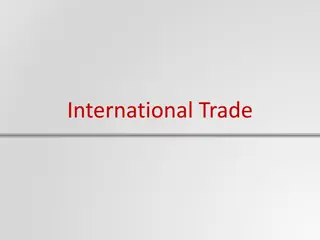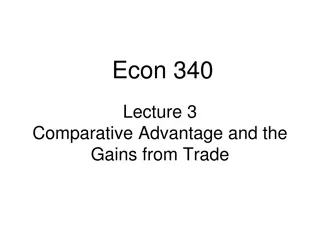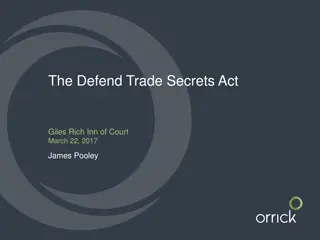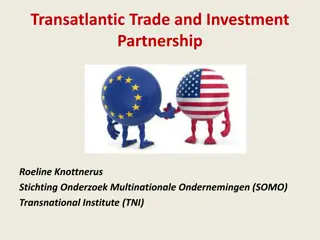Evolution of Trade Mark Law in the Public Interest
The concept of distinctiveness and countervailing norms in trade mark law is explored in the jurisdiction of the ECJ. It delves into the challenges of predicting distinctiveness, balancing various rights and interests, and the implications of allowing free registration of marks.
Download Presentation

Please find below an Image/Link to download the presentation.
The content on the website is provided AS IS for your information and personal use only. It may not be sold, licensed, or shared on other websites without obtaining consent from the author.If you encounter any issues during the download, it is possible that the publisher has removed the file from their server.
You are allowed to download the files provided on this website for personal or commercial use, subject to the condition that they are used lawfully. All files are the property of their respective owners.
The content on the website is provided AS IS for your information and personal use only. It may not be sold, licensed, or shared on other websites without obtaining consent from the author.
E N D
Presentation Transcript
Trade Mark Law and the Public Interest in Keeping Signs Available - Evolution of the Concept in the Jurisdiction of the ECJ Lionel Bently (University of Cambridge)
Distinctiveness The justification for protecting trade marks is distinctiveness in the market place Assessable ex post on the basis of empirical evidence But registration system permit protection ex ante, which raises additional problems (see below) Even if a sign is distinctive there may be countervailing norms leading to non-registrability (or non-protection)
Countervailing Norms Other people s rights/interests (relative grounds) The integrity of the legal system (morality/public policy/deception) The rights of the state and collectives (emblems, GIs) The freedom of competitors to use certain signs to compete The freedom of competitors to use certain descriptions (freedom of speech/the commons) The rights of individuals to use their own names
Countervailing Norms Absolute/ Overcomable Absolute/Not Overcomable Relative/Not Overcomable (except consent) Revocation Exception Article 4 Art 6(2) (local rights) Other people s rights Integrity of legal system Article 3(1)(f), (g); 3(2)(a), (b), (c) Art 12(2)(b) Rights of state and collectives Article 3(1)(h) Freedom of competitors to make products Article 3(1)(b) Article 3(1)(e) Freedom of competitors to use certain descriptions Article 3(1)(c), (d) Art 12(2)(a) Article 6(1)(b), (c);Art 7 Rights of individuals in their names Article 3(1)(b) Article 4(4)(c) Article 6(1)(c)
The problem of predicting distinctiveness Assuming use, how will consumers react? We know many signs, including descriptive signs, personal names and shapes, can become trade marks We do not know whether and how the trader will use the mark nor the likely response Why would we not predict that a personal name, foreign description, slogan or shape would not operate as a mark?
Concerns with permitting free for all Justification for allowing registration of marks ex ante is weak (and much less robust than the justification for protecting marks established in the market place) So, we are more concerned where such ex ante registration has a negative effect Possible negative effects on freedom to trade and freedom of speech: inability to compete at all; restriction on ability to describe goods/qualities; depletion of obvious marks (or best marks)
Reflecting these concerns Freihaltbed rfnis real, current, serious need to leave free. Discussion by Colomer in Adidas III In the UK, and most European countries, early statutes allowed registration of very limited classes of sign (not, for example, words) In the UK, case-law refused to allow registration of any sign which an honest trader is likely, in the ordinary course of business and without improper motive, to desire to use in connection with their own goods (Lord Parker in W&G du Cros (1913) Applied to YORKSHIRE for copper tubes and YORK for trailers even though 100% distinctive in fact
ECJ Jurisprudence (1) Rejected Freihaltbed rfnis in Windsurfing But recognised that Article 3(1)(c) gives effect to public interest that descriptive signs are free for traders to use (so called requirement or principle of availability ) Has failed to explain how this public interest should be applied (the test in Windsurfing being consumer- oriented, and thus problematic) Could it be wider than Freihaltbed rfnis? no need for current, serious, real just capable of being used by trader as description (Doublemint). More like old UK test.
ECJ Jurisprudence (2) Declined to treat Article 3(1)(b) as underpinned by the same public interest as Article 3(1)(c): Sat.1 Treats Article 3(1)(b) question as merely one of consumer perception (would it be recognised as a mark?) (a) does this make sense given origin/history of PC Article 6 quinquies ? (b) where does this leave Libertel? (c) can this be reconciled with principle that a descriptive mark is per se devoid of distinctive character? (d) does this cause tribunals to disguise availability considerations in assumptions about the average consumer? (Or worse still, distort the meaning of the term sign as in Dyson)? (e) Shouldn t signs be excluded wherever their monopolisation would limit or restrict capacity to compete (even if consumers would think trade marks)?
ECJ Jurisprudence (3). Some worries. Personal names. After Nichols, a trader who wants to use his own name must rely on a defence? This may be acceptable if a mark has acquired distinctiveness, but is it really right that the first to register should monopolise such a sign? Even with a common name? Foreign Equivalents. After Matratzen, foreign descriptive words could well be registrable. In US, such marks cannot be registered. What about freedom to describe good amongst small immigrant communities? Laudatory Terms. The CFI requires a description to be direct and specific. This potentially makes BEST / FINEST etc non-descriptive (for Art 3(1)(c): quaere, Article 6(1)(b)). Surely these signs should not be monopolised without distinctiveness through use?
My preference Justification for protection is distinctiveness in marketplace Registration of unused marks should only occur where there would be minimal impact on other traders (eg where highly unlikely they would choose such signs) Two components: would consumers see as a mark? Might other traders legitimately wish to use? Further consideration of requirement of availability in relation to signs that have acquired distinctiveness. (Note, for example, US refusal to register generic marks full stop)
